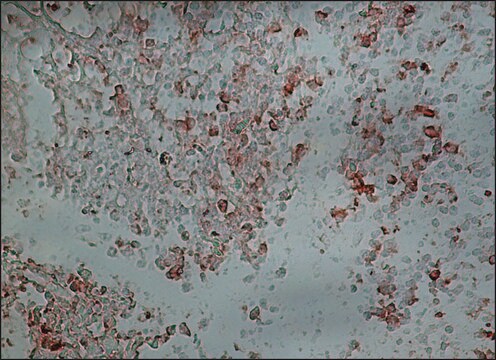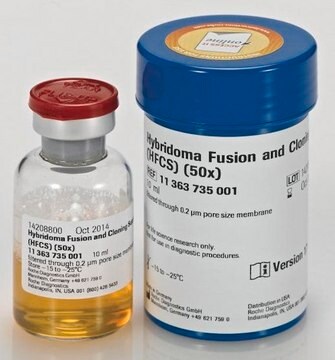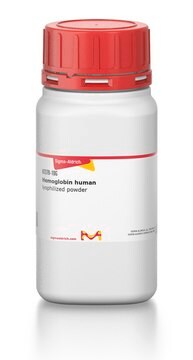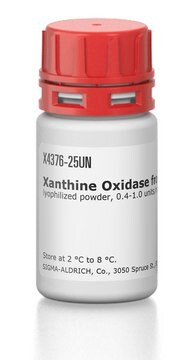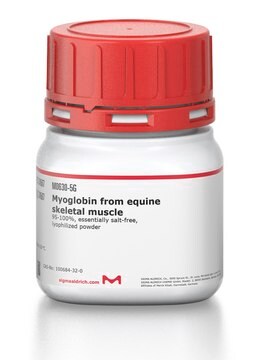ISO2
Mouse Monoclonal Antibody Isotyping Reagents
sufficient for 1000 tests (clones) (by ELISA), sufficient for 40 tests (clones) (by immunodiffusion, ODD)
Sinónimos:
Mouse Antibody Isotyping Kit
Iniciar sesiónpara Ver la Fijación de precios por contrato y de la organización
About This Item
Productos recomendados
usage
sufficient for 1000 tests (clones) (by ELISA)
sufficient for 40 tests (clones) (by immunodiffusion, ODD)
Quality Level
shipped in
wet ice
storage temp.
2-8°C
¿Está buscando productos similares? Visita Guía de comparación de productos
General description
The Mouse Monoclonal Antibody Isotyping Reagents enable qualitative isotype determination of mouse monoclonal antibosies derived from hybridoma supernatant, ascites fluid or purified forms.
Specificity
ISO-2 contains 0.2 mL vials of subclass specific antibodies to all four mouse IgG subclasses, IgA, and IgM. Directions are included for using these reagents in ELISA and Ouchterlony assays to determine the subclass of monoclonal antibodies in ascites, culture supernatants, or purified preparations. Additional reagents may be required, such as conjugates for ELISA assays or agarose and buffer components for Ouchterlony assays.
Application
Mouse Monoclonal Antibody Isotyping Reagents has been used in monoclonal antibody isotype determination using enzyme-linked immunosorbent assay (ELISA). It may be used in Ouchterlony immunodiffusion assays.
Determination of the subclass of a monoclonal antibody is helpful for characterization of the antibody, for choosing detection reagents, and for deciding on a purification scheme.
Features and Benefits
- May be used in a variety of assay formats
- Suitable for all antibody forms
- Determines all mouse IgG subclasses, IgA, and IgM
Solo componentes del kit
Referencia del producto
Descripción
- goat antisera to mouse IgA .2 mL
- goat antisera to mouse IgG3 .2 mL
- goat antisera to mouse IgG1 .2 mL
- goat antisera to mouse IgG2a .2 mL
- goat antisera to mouse IgG2b .2 mL
- goat antisera to mouse IgM .2 mL
Related product
Referencia del producto
Descripción
Precios
Storage Class
10 - Combustible liquids
Certificados de análisis (COA)
Busque Certificados de análisis (COA) introduciendo el número de lote del producto. Los números de lote se encuentran en la etiqueta del producto después de las palabras «Lot» o «Batch»
¿Ya tiene este producto?
Encuentre la documentación para los productos que ha comprado recientemente en la Biblioteca de documentos.
Violetta Sączyńska et al.
Virology journal, 15(1), 13-13 (2018-01-18)
The highly pathogenic avian influenza viruses of the H5 subtype, such as the H5N1 viral strains or the novel H5N8 and H5N2 reassortants, are of both veterinary and public health concern worldwide. To combat these viruses, monoclonal antibodies (mAbs) against
Selvaraj Pavulraj et al.
Veterinary microbiology, 210, 188-196 (2017-11-07)
Equine influenza viruses (EIVs) are responsible for acute contagious respiratory infection in equines and the disease remains a major threat for equine population throughout the world despite vaccination strategies in place. The present study was aimed to assess the suitability
Sapna Halder et al.
Cell research, 15(9), 739-744 (2005-10-11)
Rheumatoid synovial fibroblasts were used as an immunogen to produce monoclonal antibodies selected for their reactivity with stromal cell antigens. Mice were immunised with low passage whole cell preparations and the subsequent hybridomas were screened by immunohistochemistry on rheumatoid synovium
Jorma Hinkula et al.
Vaccines, 7(3) (2019-07-19)
Background: Vaccination is commonly used to prevent and control influenza infection in humans. However, improvements in the ease of delivery and strength of immunogenicity could markedly improve herd immunity. The aim of this pre-clinical study is to test the potential
Generation and characterization of novel stromal specific antibodies
Halder S, et al.
Cell Research, 15(9), 739-739 (2005)
Nuestro equipo de científicos tiene experiencia en todas las áreas de investigación: Ciencias de la vida, Ciencia de los materiales, Síntesis química, Cromatografía, Analítica y muchas otras.
Póngase en contacto con el Servicio técnico
